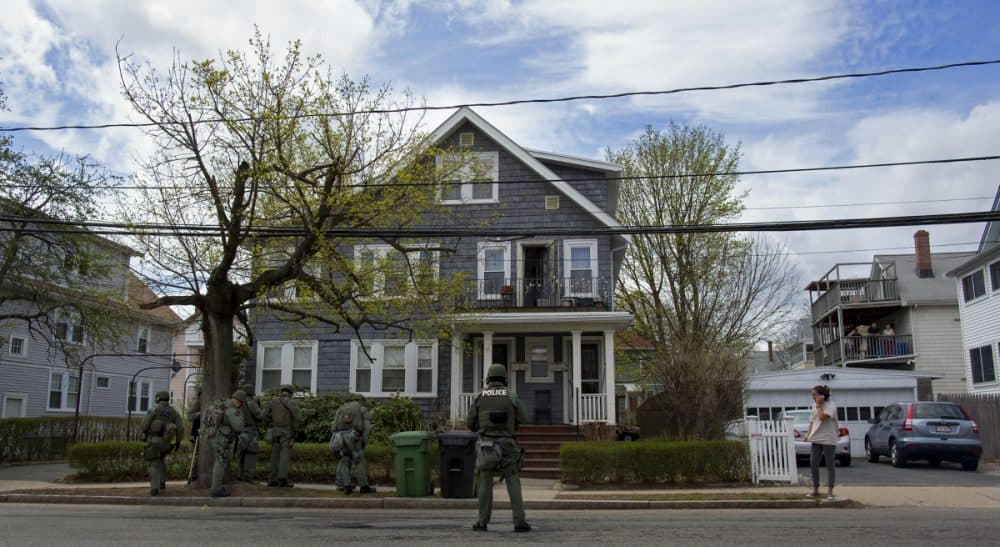Advertisement
Memories From The Lockdown

We were on lockdown. One Boston Marathon bombing suspect had been killed during the night just over a mile from our home, and the barrage of gunfire and explosions had woken the children. (What were those fireworks last night? they wondered when they stumbled sleepily from their bedrooms.) The other suspect was on the loose.
Had we ever before spent an entire day all cooped up together inside? Hour after hour we found ourselves drifting around the apartment, indolent and edgy, pausing time and again in front of the TV, on which police cars and uniformed personnel amassed in front of the very stores where we regularly buy socks and batteries, pencils and toothpaste. There was the Arsenal Mall, the familiar brick building with rainbows along the side. There was Home Depot, Target, Marshalls: how perfectly banal. We tried to make ourselves grasp what was happening.
The TV showed a teenage boy with limpid eyes and floppy hair. He was said to be armed and dangerous. “He ran over his own brother,” the reporters kept repeating, “which tells you how desperate he is.”
The phone rang. A recorded message from the police: “Stay inside. Lock your doors. Don’t open for anyone except clearly identified officers of the law.”
But manhunt or no, eventually the dog had to go out. I snapped on his leash.
The day was golden, as strangely perfect as a cake decoration. The birds seemed in unusually high spirits, until I realized it was just the absence of other sounds muffling them. No people, no cars, no lawnmowers, no radios, no basketballs bouncing on the middle school court.
The phone rang. A recorded message from the police: 'Stay inside. Lock your doors. Don’t open for anyone except clearly identified officers of the law.'
As I walked the empty streets I couldn’t help picturing him everywhere. He was squatting behind that retaining wall, pressed up against the side of that garage, flattened just beneath this privet hedge.
What would I do when our eyes met? What could I do? Nothing. Nothing that could help either of us. There amid the trees newly sprigged with green and the air that smelt of nectar, I felt invaded by a weighty, mineral sorrow. I envisioned coming upon him just beyond the slatted fence. I saw that I would crouch, wordless, engorged with pity. Extend my hand. The way you’d do with any broken thing.
Is that appalling? This is one of the bombers, I reminded myself. Responsible for inflicting incalculable pain.
But I could not wrest my mind from the pain he must be in, this boy hardly older than my own oldest child.
The horror of the bombing was not abstract. We’d been at the marathon. My sister-in-law ran. We’d gone to mile 24 to cheer her on. Right after she passed, looking exhausted but happy to be so near the end, a policeman approached and ordered me to open my bag. He glowered at its contents, then moved briskly on. That was a little intense, we all remarked. For a random bag check. A car screeched up behind us and the driver called wildly out the window, “Anyone know how many people were killed at the finish line?” Then he drove away. What? We were all turning to each other, asking, What? What did he say?
Advertisement
Later, in addition to media reports, we’d hear multiple accounts from friends who’d been caught in the commotion closer to the blasts. And for days the fear, the adrenaline, the outrage, the grief — all of it swirled sulfurously throughout the city, inhaled and exhaled like so much second-hand smoke.
But on that queerly pristine April afternoon, everything seemed to declare itself intact. The dog sniffed and peed. The birds sang. The crocuses nosed themselves forward all purple and white. What remained abstract was this person, this Dzhokhar Tsarnaev who my imagination was working so furiously to conjure.
On the one hand we have concretes: the flowers, the dog needing to do his business, the familiar stores where we buy necessities, the police officers working to keep us safe. On the other hand we have the almost-impossible-to-imagine truth that this teenage boy (he’d attended Cambridge Rindge and Latin with the daughter of a friend!) had chosen to kill and maim. I don’t know how we do it, but I know it’s really, really important that we not keep these truths apart, relegated to separate bins. If we are to help heal the world, we cannot deal only with what is easily understood. We need to try to fathom that which we find unfathomable.
Related:
